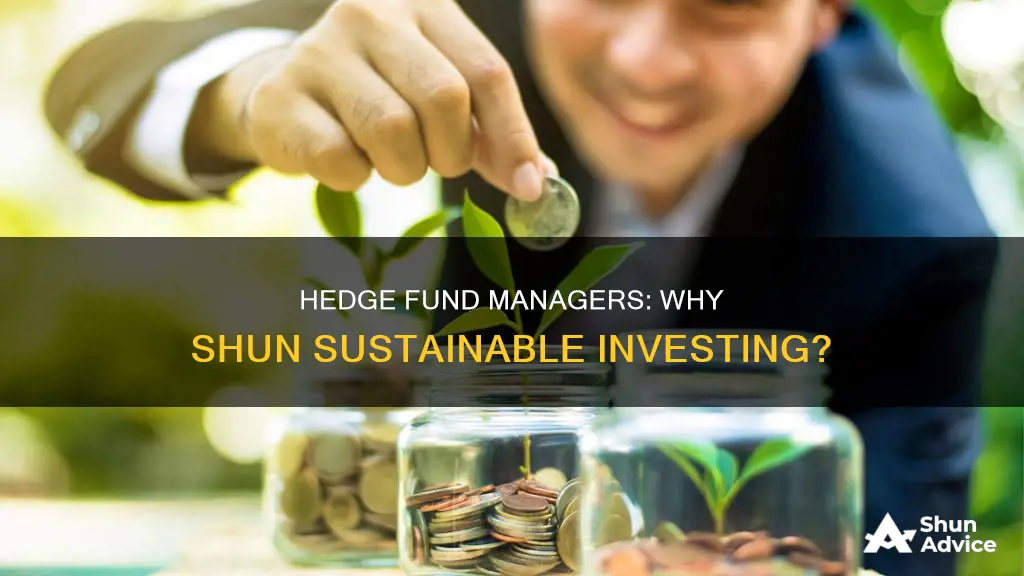
Hedge fund managers have been slow to adopt sustainable investing strategies, with only 15% of funds incorporating environmental, social and governance matters (ESG) in their investment strategies. Managers cite inconsistent and insufficient sustainability data as the biggest challenge to adopting ESG, with more than a third also pointing to confusion over industry terminology. Sustainable investing is one of the fastest-growing areas in money management, with about $30.7 trillion held in sustainable or green investments in 2018, but some hedge fund managers remain sceptical, expressing concerns about greenwashing and the lack of standardisation in ESG funds.
| Characteristics | Values |
|---|---|
| Lack of quality and consistent sustainability data | 63% |
| Confusion over industry terminology | 36% |
| Not relevant to our strategy or mandate | 25% |
| Lack of quality investment opportunities | 21% |
| Shortage of knowledge or expertise | 18% |
| Difficulty in delivering financial/non-financial return | 13% |
| Excessive costs in incorporating sustainability | 12% |
| Fiduciary concerns | 9% |
| Political or regulatory uncertainty | 1% |
What You'll Learn

Lack of standardisation and inconsistent data
Hedge fund managers have been reluctant to adopt sustainable investing strategies, with only about 15% of funds incorporating environmental, social and governance matters (ESG) in their investment strategies. A survey found that 63% of money managers cited a lack of consistent and quality sustainability data as the biggest challenge in making such decisions. This issue of inconsistent data and definitions is further exacerbated by confusion over industry terminology, with over a third of managers expressing uncertainty.
The lack of standardisation in ESG metrics makes it difficult for investment managers to efficiently integrate impact measures into their decision-making processes. Without a universal set of principles or metrics, it is challenging for investors to accurately assess and compare the ethical standards of different funds. This challenge is recognised by industry regulators, who are attempting to harmonise ESG standards to accelerate the growth of the green finance sector. Efforts to standardise ESG criteria include the CFA Institute's ESG disclosure standards, designed to aid investors in understanding whether prospective products align with their objectives.
However, standardising ESG criteria is a complex task. While quantifiable factors like carbon emissions can be easily standardised, subjective factors like corporate governance are more difficult to fit into a uniform framework. This complexity is further compounded by the dynamic nature of ESG investing, which continues to evolve and expand, requiring ongoing adaptation and communication between buyers and sellers of investment products.
The lack of standardisation and inconsistent data in ESG investing creates challenges for hedge fund managers in making informed decisions and reporting data to regulators. These issues are recognised by industry participants and regulators alike, with efforts underway to address them and promote greater transparency and comparability in the ESG investing landscape.
Best Investment Funds: Where to Invest Your Money
You may want to see also

Confusion over industry terminology
The term ESG (Environmental, Social and Corporate Governance), for example, is used to evaluate a company's social and environmental impacts, as well as its impact on communities, customers and employees. However, without standardisation, interpretations can vary between companies and legislatures. This grey area can lead to greenwashing, where companies attempt to deceive customers or clients into believing their products or services are more environmentally friendly than they are in reality.
The challenge of inconsistent terminology is not unique to the ESG landscape. The broader field of socially responsible investing (SRI) also encompasses a wide range of strategies and concerns that differ between continents and investor groups. SRI can include integrating extra-financial information into investment decision-making, investing only in companies that score best in ethical and sustainable development, or employing screening tools to avoid unsustainable companies or sectors.
The lack of clear and consistent terminology can make it difficult for hedge fund managers to navigate the sustainable investing space and make informed decisions about incorporating ESG or SRI into their investment strategies.
Venture Capital Funds Backing Xenex Disinfection Services
You may want to see also

Not relevant to their fund's strategy
Hedge fund managers have been slow to adopt sustainable investing, with only about 15% of funds having incorporated environmental, social, and governance matters (ESG) in their investment strategies. One of the main reasons for this reluctance is the belief that ESG is not relevant to their fund's strategy or mandate, especially for those that rely on short-term holdings or daily traded markets like currencies. This perspective is influenced by the traditional view of sustainable investing as a "vocational" or PR-focused endeavour rather than a serious investment strategy.
However, the landscape is changing, and sustainable investing is gaining traction. There is growing demand from investors, particularly the younger generation, for investment options that align with their values and ethical concerns. This shift in investor preferences is creating a new market opportunity for hedge funds to explore.
While some managers embrace ESG and its potential for positive impact and competitive differentiation, others remain sceptical, citing inconsistent sustainability data and a lack of standardisation in ESG metrics as challenges. The absence of universal principles or metrics makes it difficult for investors to accurately assess the ethicality of a fund relative to others. This lack of standardisation also complicates regulatory reporting, as hedge fund managers struggle to consistently provide data to regulators.
Additionally, the recent European Principle Adverse Impact (PAI) rule, which requires firms to disclose whether their investment activities may harm the environment, has left some hedge fund managers confused and concerned about the potential impact on their business models.
In summary, while some hedge fund managers acknowledge the growing importance of sustainable investing, others maintain that it is not relevant to their fund's strategy, citing traditional views, inconsistent data, lack of standardisation, and regulatory challenges as reasons for their reluctance to adopt ESG practices.
Land vs Mutual Funds: Where Should You Invest?
You may want to see also

Lack of quality investment opportunities
Hedge fund managers have been slow to adopt sustainable investing, with only 15% of funds incorporating environmental, social, and governance matters (ESG) into their investment strategies. While investors are increasingly interested in ESG-focused offerings, a survey found that 21% of managers cited a "lack of quality investment opportunities" as a reason for avoiding sustainable investing.
This perceived lack of quality investment opportunities may be due to several factors. One key challenge is the lack of standardised and consistent sustainability data. About 63% of money managers reported that inconsistent and insufficient data was the biggest obstacle to making investment decisions that incorporate ESG considerations. Without reliable data, it is difficult for hedge fund managers to accurately assess the sustainability and ethical credentials of potential investments.
The lack of standardisation in ESG metrics and principles also contributes to the perception of limited quality investment opportunities. Without a universal set of standards, it is challenging for investors to accurately compare and evaluate the sustainability of different funds or companies. This lack of standardisation can lead to concerns about "greenwashing", where companies or funds may be marketed as environmentally responsible without substantiating data or evidence.
Additionally, some hedge fund managers may view sustainable investing as a niche or specialised field, particularly for funds that focus on short-term holdings or daily traded markets. The perception that there are fewer quality investment opportunities in the sustainable space could be influenced by the belief that ESG considerations are not as relevant or applicable to their specific investment strategies or mandates.
Furthermore, the integration of ESG factors into investment decisions can be complex and require expertise that may not be readily available within hedge fund management teams. A shortage of knowledge or expertise was cited by 18% of managers as a reason for avoiding sustainable investing. This suggests that expanding access to knowledge and resources could help address the perceived lack of quality investment opportunities.
In summary, hedge fund managers' perception of a lack of quality investment opportunities in sustainable investing is influenced by data inconsistencies, a lack of standardisation, the perceived niche nature of sustainable investing, and a shortage of specialised expertise. However, as investor demand for ESG-focused offerings increases, hedge fund managers may need to reevaluate their assumptions and explore ways to identify and capitalise on sustainable investment opportunities.
Hedge Fund GPs: Benefits of Investing in Their Own Fund
You may want to see also

Excessive costs of incorporating sustainability
Some hedge fund managers are concerned about the excessive costs of incorporating sustainability into their investment strategies. This was cited as a challenge by 12% of managers in a survey. The costs of adopting environmental, social, and governance (ESG) matters or similar approaches into their investment strategies can be significant, and this may deter some hedge funds from embracing sustainable investing.
The costs of incorporating sustainability can be substantial, and the benefits may not always be clear or immediate. Hedge funds often have complex structures and strategies, and making changes to incorporate sustainability may require significant adjustments to their operations. This could involve hiring new talent with expertise in sustainable investing, developing new processes and criteria for evaluating investments, and potentially changing their existing investment portfolios.
Additionally, there may be costs associated with increased data and reporting requirements. As investors and regulators pay closer attention to ESG and similar factors, hedge funds may need to invest in new systems and processes to collect, analyse, and disclose relevant data. This can be especially challenging for hedge funds that invest in a wide range of assets and markets, as the data and reporting requirements can vary significantly across different industries and regions.
Furthermore, there may be costs associated with mitigating the risks of "greenwashing". Greenwashing refers to the practice of making misleading claims about the environmental benefits of a company's products or services. Hedge funds that want to avoid greenwashing may need to invest in additional due diligence and research to ensure the accuracy of their sustainability claims. This can be a complex and resource-intensive process, particularly for funds that invest in a diverse range of companies and industries.
Finally, there may be opportunity costs associated with incorporating sustainability. By focusing on sustainable investments, hedge funds may need to forgo other potentially profitable investment opportunities. This could impact their financial performance, especially in the short term. As such, some hedge fund managers may be hesitant to embrace sustainable investing until they can better understand and mitigate the potential costs and risks involved.
Global Investment: Largest Funding Sources in Banking
You may want to see also
Frequently asked questions
Hedge fund managers have been slow to adopt sustainable investing, citing inconsistent and insufficient data as well as a lack of expertise in this area. They also fear "greenwashing", where companies may use misleading labels to create an illusion of environmental responsibility.
ESG stands for Environmental, Social and Corporate Governance and is used to evaluate a company's social and environmental impact on communities, customers and employees. While ESG funds can be a force for good, hedge fund managers are concerned about recommending funds marketed as 'ethical' and 'sustainable' when the data does not necessarily support these claims. There is also a lack of standardisation, making it challenging for managers to report data to regulators consistently.
SRI dates back several centuries, with norm-oriented investors incorporating their values into investment decisions. In recent years, environmental disasters, global warming and social concerns have driven the growth of SRI. While SRI is barely present within the hedge fund space, it is believed that SRI will enter this space due to increasing investor demand for ethical and sustainable investment options.







